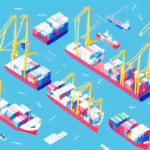FedEx International Controlled Export: Shipping Items Subject to Export Control Regulations
For businesses shipping items internationally, understanding export control regulations is essential to comply with both domestic and foreign laws and avoid legal penalties. Export controls are laws and regulations that govern the export, re-export, and transfer of goods, technology, and software from one country to another. These regulations protect national security and foreign policy interests by restricting the export of certain sensitive items.
Understanding Export Control Regulations and Requirements
Export control regulations are complex and vary by country. Businesses must comply with both domestic laws and the laws of the destination country. The primary purpose of export controls is to prevent the transfer of sensitive goods and technology to countries and organizations that pose a threat to national security, including terrorist organizations and hostile foreign governments.
Items subject to export control regulations include goods that have both civilian and military applications, such as electronics, software, chemicals, and weapons. The U.S. Department of Commerce, the U.S. Department of State, and the U.S. Department of the Treasury are the primary agencies responsible for overseeing and enforcing export controls.
It is crucial for businesses to conduct due diligence and obtain the necessary licenses and permits before exporting goods. Failure to comply with export control regulations can result in severe penalties, including fines and imprisonment. Additionally, non-compliance can damage a company's reputation and lead to loss of business opportunities. Therefore, staying up-to-date with the latest regulations and seeking legal advice if necessary is imperative.
Navigating the Complex World of International Trade
International trade presents numerous challenges, especially for small and medium-sized enterprises (SMEs) with limited resources. Export regulations can be overwhelming, and non-compliance can result in severe penalties, including fines and imprisonment. To overcome these challenges, SMEs often partner with shipping companies that have expertise in international trade and can assist in navigating the complex landscape of export control compliance.
However, partnering with a shipping company is not the only solution. SMEs can also seek assistance from government agencies that provide resources and guidance on international trade regulations. For instance, the U.S. Small Business Administration offers counseling and training programs to help SMEs understand export regulations and develop strategies for international trade.
Additionally, leveraging technology can streamline international trade operations. Various software solutions are available to automate export compliance processes, such as screening for restricted parties and generating export documentation. By utilizing these tools, SMEs can reduce the risk of non-compliance and focus on expanding their business in the global market.
The Role of FedEx in Export Control Compliance
FedEx is a trusted shipping partner for businesses that ship items subject to export control regulations. FedEx assists businesses in determining whether their items require an export license and facilitates the clearance process by working with customs officials to ensure compliance with international trade regulations. Additionally, FedEx provides packaging and labeling guidance to help businesses meet regulatory requirements.
Beyond compliance services, FedEx offers training and educational resources to help businesses understand and navigate the complex world of export control regulations. These resources include webinars, online courses, and in-person workshops led by experts in the field. Partnering with FedEx ensures that businesses not only meet their compliance obligations but also stay up-to-date on the latest regulatory developments and best practices.
Benefits of Using a Trusted Shipping Partner for Controlled Exports
- Compliance and Risk Reduction: FedEx understands the unique challenges of international trade and provides guidance on navigating country-specific regulations and restrictions, reducing the risk of non-compliance and legal penalties.
- Visibility and Control: Advanced tracking and monitoring capabilities allow businesses to track their shipments in real-time and receive alerts if any issues arise, facilitating informed decision-making and quick problem resolution.
- Wide Range of Shipping Options: FedEx offers various shipping solutions tailored to the unique needs of different industries and businesses, including express, ground, and freight shipping, optimizing shipping processes and improving overall efficiency.
What Qualifies as an Item Subject to Export Control Regulations?
Items subject to export control regulations include goods that have both civilian and military applications, such as electronics, software, chemicals, and weapons. Export controls also apply to technology and software used to develop, produce, or support regulated items. Even technology and software unrelated to regulated items may be subject to export controls if exported to a restricted end-user or for a restricted end-use.
Export control regulations vary by country and can change frequently. Exporters are responsible for staying up-to-date on regulations and ensuring compliance. Non-compliance can result in severe penalties, including fines and imprisonment.
Additionally, some items may be subject to both export control regulations and other trade regulations, such as sanctions or embargoes. It is essential to carefully review all applicable regulations before exporting any goods or technology.
How to Determine if Your Item Needs an Export License
Businesses must determine if their item is subject to export control regulations and whether an export license is required. The Export Administration Regulations (EAR) provide guidance on determining if an item requires an export license. This involves reviewing the item’s Export Control Classification Number (ECCN) and the destination country’s Country Chart to ascertain licensing requirements.
Even if an item does not require an export license, it may still be subject to certain restrictions or regulations, such as re-export licenses or end-use restrictions. Thorough research and understanding of all applicable regulations are imperative before exporting any item.
Businesses should also consider the potential risks and consequences of exporting their items, including the risk of violating export control regulations and the potential misuse of items for illegal or harmful purposes. Conducting due diligence on potential buyers and end-users and implementing a comprehensive compliance program can help mitigate these risks.
Essential Steps for Exporting Controlled Items with FedEx
To export items subject to export control regulations with FedEx, businesses must follow several essential steps:
- Determine if the item requires an export license: Assess the item's ECCN and destination country requirements.
- Obtain any necessary licenses: Secure the appropriate export licenses or permits.
- Complete required paperwork: Prepare export declarations, commercial invoices, and bills of lading.
- Ensure proper packaging and labeling: Comply with regulatory packaging and labeling requirements.
- Arrange for transportation with FedEx: Coordinate shipment logistics with FedEx experts.
The regulations surrounding the export of controlled items can vary depending on the destination country. Businesses should research and understand specific regulations for each country they plan to export to.
Additionally, utilizing FedEx's consulting services can ensure compliance with all export regulations. These services provide guidance on classification, licensing, and documentation requirements, as well as assistance with compliance audits and training.
Best Practices for Packaging and Labeling Controlled Exports
Proper packaging and labeling are essential to ensure that items are transported safely and meet regulatory requirements. Businesses should consult with FedEx to determine the specific packaging and labeling requirements for their items and destination countries. Adhering to these practices can help reduce the risk of customs delays and ensure timely delivery of goods.
Understanding Country-Specific Regulations and Restrictions
Export control regulations vary by country, and businesses must comply with both domestic laws and the laws of the destination country. Some countries have comprehensive export control regimes that restrict the export of a wide range of goods and technology. Understanding these country-specific regulations and restrictions is crucial to ensure compliance with international trade laws.
Businesses must conduct thorough research on the regulations and restrictions of the destination country before exporting their goods. This includes understanding licensing requirements, necessary documentation, and any potential sanctions or embargoes that may be in place. Non-compliance can result in legal consequences, fines, and damage to the company's reputation.
Moreover, businesses must stay informed about any changes or updates to regulations and restrictions, as these can occur frequently and impact the ability to export certain goods or technology. Staying up-to-date helps businesses avoid potential compliance issues and ensures a smooth export process.
Avoiding Common Mistakes When Shipping Controlled Exports
When shipping items subject to export control regulations, businesses must avoid common mistakes that can lead to legal penalties. These mistakes include:
- Failure to obtain necessary licenses
- Incomplete or inaccurate paperwork
- Improper packaging and labeling
Partnering with a shipping company like FedEx can help businesses reduce the risk of non-compliance and avoid these common mistakes, ensuring a seamless export process.
The Consequences of Non-Compliance with Export Control Regulations
The consequences of non-compliance with export control regulations can be severe, including:
- Fines and monetary penalties
- Imprisonment for responsible individuals
- Loss of export privileges
- Damage to the business’s reputation
- Strained relationships with customers and suppliers
By complying with export control regulations, businesses can protect their reputation and avoid these significant legal and financial penalties.
How to Stay Up-to-Date with Changing Regulations and Requirements
Export control regulations are subject to change, and businesses must stay informed about evolving requirements to ensure compliance. The best way to stay informed is to work with a trusted shipping partner like FedEx, which has expertise in international trade. FedEx can provide guidance on changing regulations and requirements, helping businesses remain compliant with the latest export control laws.
Expert Guidance for Successful International Trade Operations
International trade can be challenging, especially for SMEs with limited resources. Partnering with a trusted shipping partner like FedEx provides businesses with access to expert guidance to navigate the complexities of international trade. FedEx offers support in areas such as:
- Export control compliance
- Packaging and labeling
- Country-specific regulations and restrictions
This comprehensive support helps businesses succeed in global markets while minimizing the risks associated with export control regulations.
Conclusion: FedEx International Controlled Export - Your Trusted Partner in Global Shipping Compliance
For businesses shipping items subject to export control regulations, partnering with a trusted shipping partner like FedEx is essential to ensure compliance with both domestic and foreign laws. FedEx provides expert guidance on export control compliance, packaging and labeling, and country-specific regulations and restrictions. By working with FedEx, businesses can succeed in global markets while reducing the risk of non-compliance and avoiding legal penalties.






















